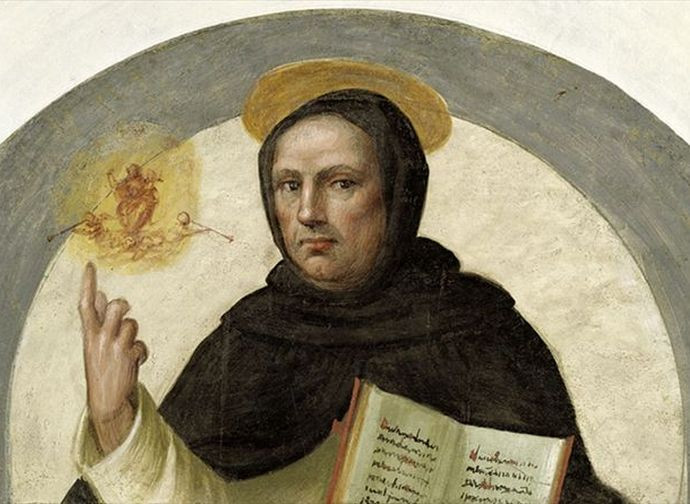Saint Vincent Ferrer
His life turned around when Jesus appeared to him between Saint Dominic and Saint Francis, ordering him to devote himself to preaching. The sermons of St Vincent Ferrer (1350-1419) were very vigorous but always based on charity, which led him to travel tirelessly to admonish souls to conversion. Because of his apocalyptic style, his contemporaries called him “the Angel of Judgement”.

His preaching was vigorous but always based on charity, which led him to travel tirelessly to warn souls to convert. His contemporaries called him “the Angel of Judgement” and Saint Vincent Ferrer (1350-1419) was certainly the most famous apocalyptic preacher of his time, which was marked by profound lacerations in the Church. He was born in Valencia at the height of the Avignon captivity, i.e. during the long period when the seat of the papacy was established in Avignon (1309-1377). He began studying theology at the age of 14, taking the Dominican habit just three years later.
In the intricate and painful affair that led to the Western Schism, he initially sided with the man who would go down in history as Antipope Clement VII, elected by the French cardinals (September 1378) five months after the ascent to the papal throne of Urban VI, who had taken this name with the intention of definitively re-establishing the seat of the papacy in the City (Urbe) of Rome, where it had been returned the year before by his predecessor. It was during this phase that the young Dominican met Cardinal Pedro de Luna, who in turn became antipope in 1394 under the name Benedict XIII, swearing that he would work for the unity of the Church and choosing Vincent as his confessor. The saint became one of the most influential figures in the world of Avignon: from this position he worked in various ways to recompose the schism (which saw kingdoms all over Europe siding either with the legitimate pope in Rome or with his antagonist in Avignon), until in 1399 he decided to resign from all his posts.
This decisive turning point had been preceded by a serious illness, from which Vincent was suddenly cured thanks to an intervention by Jesus, who appeared to him between St Dominic and St Francis of Assisi, ordering him to devote himself to preaching and to warn people of the coming of the Antichrist. For the next twenty years of his life on earth, he travelled the length and breadth of France, Italy and Spain, calling himself a "messenger of the Apocalypse, sent into the world to preach the coming of the Last Day". His itinerant preaching was accompanied by continuous miracles ("it was a miracle when he did not perform miracles", wrote one of his hagiographers), attested to at his canonisation process by numerous witnesses. He only preached in Valencian, but, according to the sources, he was understood by everyone, regardless of their geographical origin; the miracle in Genoa is particularly famous, when everyone present heard him speak in their own language.
The central theme of his sermons was the need for penance, and so many souls were converted by him that hundreds followed him on his travels. He identified the Antichrist with a real man and prophesied: "In the days of peace that are to come after the desolation of revolutions and wars, before the end of the world, Christians will become so disinterested in their religion that they will refuse to receive the Sacrament of Confirmation, saying that it is a useless Sacrament; and when the false prophet, the forerunner of the Antichrist, comes, all those who are not confirmed will apostatize, while those who are confirmed will remain firm in the faith, and only a few will deny Christ". He urged people to ask for God's forgiveness and, since the salvation of souls was his main concern, he spent a lot of time praying for the sick, freeing the possessed, and hearing confessions.
In the meantime, Vincent had tried in vain to convince the antipope Benedict XIII to resign, reminding him that he had sworn to do the good of the Church. The Council of Constance succeeded in ending the schism in 1417, two years before the saint's death. Among his many writings, the Treatise on the Spiritual Life is worth mentioning, in which he spoke, among other things, of the gentleness to be used with sinners on the path to conversion: “Be like a father who takes pity on his guilty children [...] or, better still, have the tenderness of a mother who caresses her little ones. Rejoice in their progress and in the hope they have of deserving the glory of Paradise”.
Patron of: roof builders, preachers
